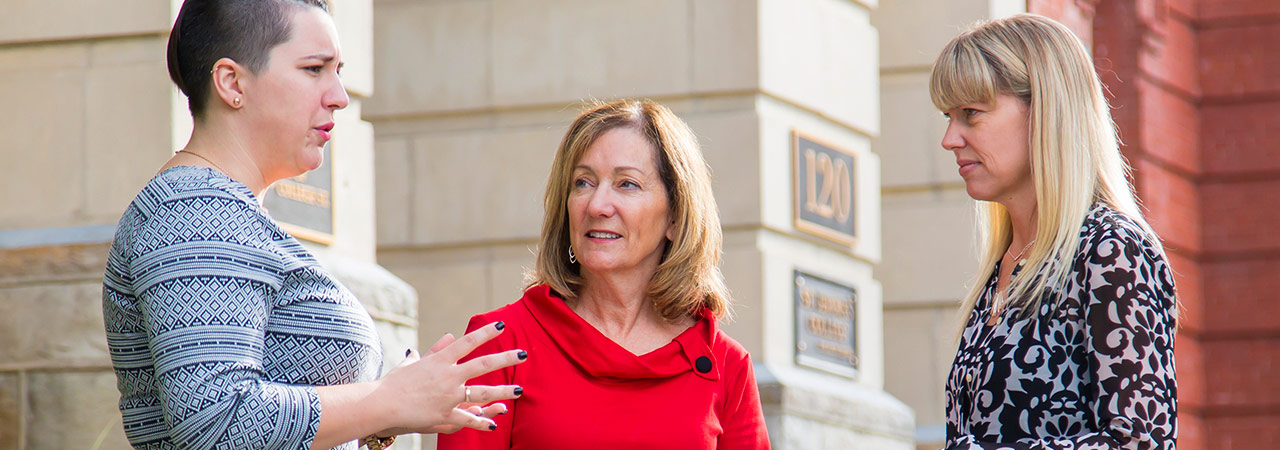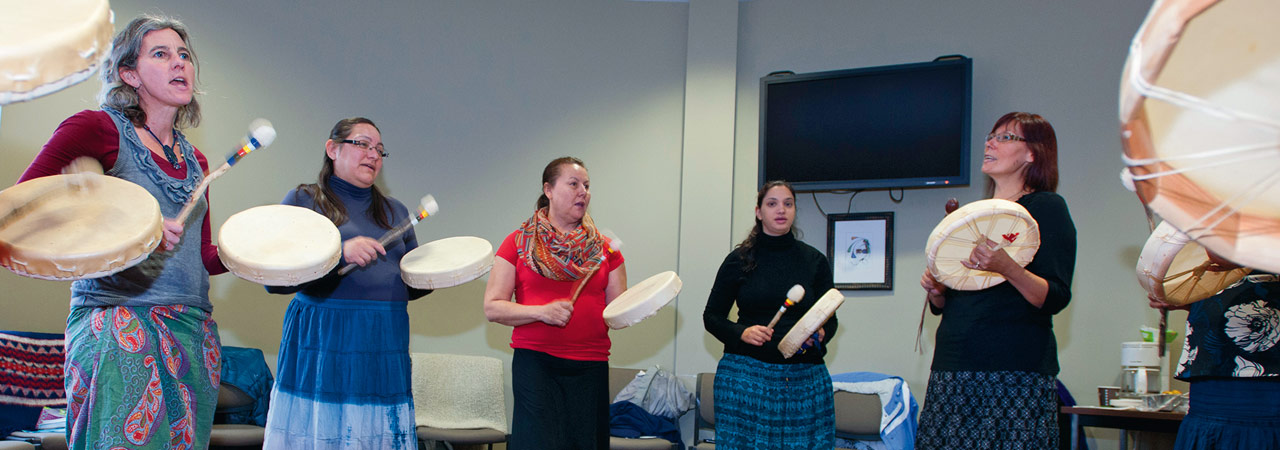
When Laurier’s Faculty of Social Work first opened its doors on Sept. 6, 1966, founders of the new school were determined their program would focus on cutting-edge research, become engrained in the community and provide students a well-rounded education.
The faculty's first dean, Sheldon L. Rahn, would surely be proud those pillars remain a primary focus 50 years later.
That's not to say things haven't changed over the years.
"After starting out as a smaller program, the faculty has certainly evolved," Dawn Buzza, acting dean of Laurier’s Faculty of Social Work, says during an interview in her Kitchener office. "The work that is done here puts a focus on today’s most urgent social issues, as well as the evolving landscape of social policies and practices. I think that's a real strength."
When Laurier's Faculty of Social Work was founded in 1966, there was great need for professionally trained social workers in southwestern Ontario, as former associate professor Frank Turner writes in I Remember Laurier: Reflections by Retirees on Life at WLU.
"The opening of the school in the fall of 1966 came at a time when social work in Canadian universities was rapidly expanding," Turner writes. "The mental health movement was a high priority of the federal government of the day. Thus there was federal money available to universities to start or expand programs in social work."
From its beginning with just 28 students studying in the Waterloo Lutheran Seminary half a century ago, the Faculty of Social Work has grown to more than 600 students who today study at Laurier's downtown Kitchener location and its Brantford campus, where students are situated close to the social service agencies with which they work.
The faculty's 40,000-square-foot Kitchener location – where graduate students study – was at one time home to St. Jerome’s College, a former high school in the city’s downtown core. The university transformed the building into a revitalized teaching facility that opened in 2006.
Author Andrew M. Thomson notes in Leadership and Purpose: A History of Wilfrid Laurier University that "a partnership with the City of Kitchener allowed the renovation of the building as a new home for the Faculty of Social Work, which had outgrown its location on the Waterloo campus… For the first time since its inception, Social Work had a standalone facility that reflected its ambition and curriculum."
The move to Kitchener was in large part made possible thanks to a generous donation from Waterloo business leader and philanthropist Lyle Shantz Hallman. In recognition of his contribution, the Faculty of Social Work was renamed the Lyle S. Hallman Faculty of Social Work in 2004, two years before the faculty moved to Kitchener.
The Faculty of Social Work has been forging new ground during recent years, offering the first master of social work program in Canada to focus on an Aboriginal field of study. The program offers students an education rooted in a wholistic Indigenous worldview, as well as contemporary social work practice.
"It is unique in Canada as a social work program that focuses on Indigenous ways of knowing and Indigenous practices," Buzza says. "A major goal is for the students to get in touch with who they are culturally – including their intellectual, spiritual, emotional and physical selves. Personal growth is really important as a focus of the program."
Initially a graduate program, Laurier’s Faculty of Social work today offers degrees at the bachelor, master's and doctoral levels. Field placements in the community are a key component of the program, providing students practical experience in their chosen field of study.
The faculty's newest bachelor of social work program – offered at Laurier’s Brantford campus – is a generalist bachelor of social work degree with a focus on Aboriginal issues. The program got its start four years ago and the first cohort of students is set to graduate this spring.
"It's a really great addition to the faculty," Buzza says. "It has tremendous potential for some mentorship from our master's and PhD students, and graduates of that program will be great candidates for our master's level social work education."
Another new area of focus for Laurier's Faculty of Social work is global citizenship, with students encouraged to learn about social work practices around the world and offered the chance to undertake field placements in international locations. By next year, the faculty plans to offer a graduate diploma in international social work.
Other unique initiatives the faculty is involved with include the Social Innovation Research Group and the Manulife Centre for Community Health Research, which together act as a bridge between the faculty and community in an effort to enhance innovation and creative working partnerships.

To mark it's 50th anniversary, the Faculty of Social Work held three events in September and October. The first saw the faculty welcome guest speaker Cindy Blackstock, a well-known First Nations activist, executive director of First Nations Child and Family Caring Society of Canada and a professor of School of Social Work at McGill University.
“Cindy’s career as a social worker and her dedication to bringing justice to Indigenous children in Canada represent the core values of Laurier’s Faculty of Social Work,” Buzza says. “Our faculty is focused on issues of equity and social justice. Cindy’s story reflects the huge impact that social work can have on society and social policy in Canada.”
The faculty also held a 50th anniversary symposium, which placed a spotlight on eight faculty members who offered presentations about their current research. One of the topics discussed at the symposium was the Walls to Bridges Collective, an innovative program that brings together incarcerated students and campus students in semester-long college or university courses held at correctional facilities.
In November, the faculty held a special event for its field placement agencies, some of which have been providing community placements for social work students for 50 years.
"Celebrating and recognizing the faculty's community partners is very important," Buzza says. "They are such a big part of the educational experience we provide."
In 2006, Laurier's Faculty of Social Work supported the development of the Aboriginal Field of Study program at the master's level under the leadership of Indigenous scholar Malcolm Saulis and elder Jean Becker.
The Aboriginal Field of Study program offers students a graduate education rooted in Indigenous worldviews with a goal to graduate social work practitioners who understand contemporary issues in practice.
Unique in Canada, the program facilitates transformative experiences in learning. Instructors and students teach and learn "in-circle," utilizing Indigenous scholarship with a process that is grounded in Indigenous knowledge in relationship to the land.
Graduates become critically conscious social workers who understand the impacts of colonization and the power of cultural knowledge in their wholistic healing practice.